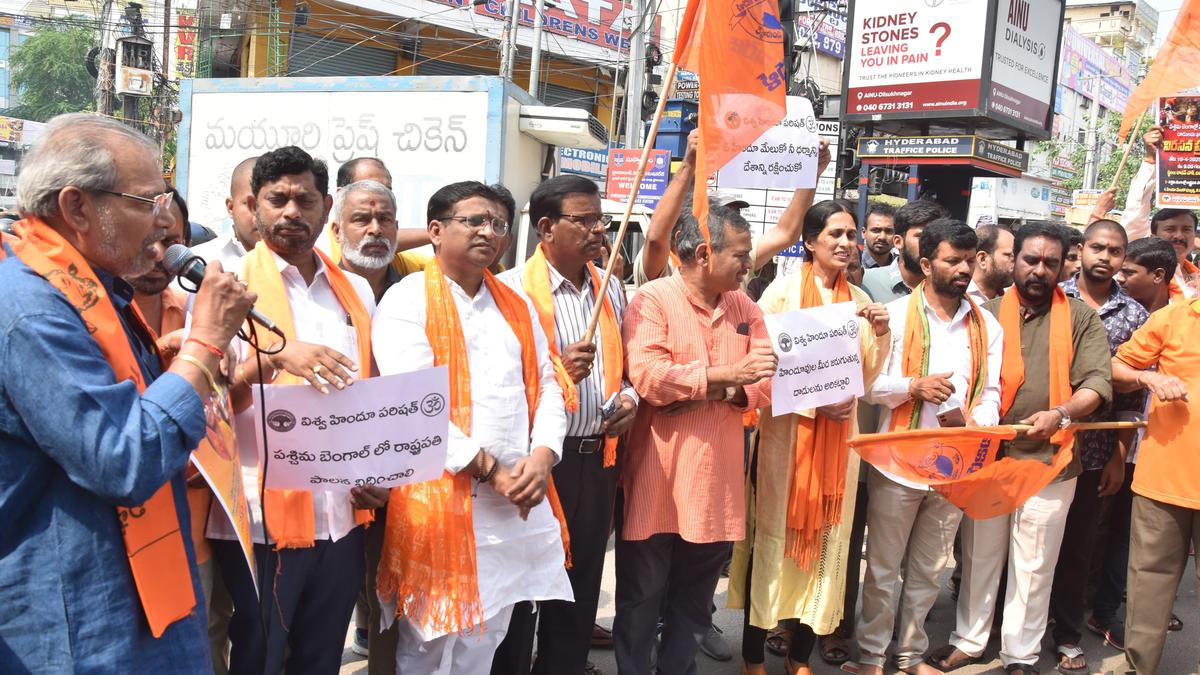VHP Protests Alleged Hindu Persecution in West Bengal
National NationalPosted by AI on 2025-04-19 22:23:01 | Last Updated by AI on 2025-08-02 05:07:50
Share: Facebook | Twitter | Whatsapp | Linkedin Visits: 4

"We will not tolerate the persecution of Hindus," echoed through the streets of Kolkata as Vishva Hindu Parishad (VHP) members rallied, protesting what they describe as targeted attacks against the Hindu community in West Bengal. The demonstrations, marked by saffron flags and fervent chants, brought parts of the city to a standstill, highlighting the escalating religious tensions in the state. The VHP alleges a systematic campaign of violence and intimidation against Hindus, citing incidents ranging from property damage to physical assaults.
The recent Durga Puja celebrations, typically a time of unity and joy, became a flashpoint. Clashes erupted in several districts, with reports of idol desecration and communal violence. The VHP claims these incidents are not isolated but part of a larger pattern of oppression. They point to specific areas, alleging that Hindus are being forced to flee their homes due to threats and violence, particularly in areas with a significant Muslim population. While independent verification of all claims remains ongoing, the visible unrest underscores the deep communal divide. The protests have drawn support from various Hindu organizations, further amplifying the message and escalating the political pressure on the state government.
The ruling Trinamool Congress (TMC), led by Chief Minister Mamata Banerjee, has vehemently denied the allegations, accusing the VHP of politicizing the situation and attempting to polarize the state along religious lines. The TMC maintains that the incidents are isolated criminal acts, not indicative of systemic persecution. They emphasize their commitment to maintaining law and order and protecting all citizens, regardless of their religious affiliation. The state government points to arrests made in connection with the violence as evidence of their swift action against perpetrators. However, the VHP dismisses these efforts as insufficient, demanding a more comprehensive investigation and concrete measures to ensure the safety and security of the Hindu community.
The protests have drawn sharp criticism from opposition parties and civil society groups, who accuse the VHP of exploiting religious sentiments for political gain. Concerns have been raised about the potential for further escalation and the need for dialogue to de-escalate tensions. Amidst the accusations and counter-accusations, the underlying reality remains: communities are fractured, fear is palpable, and trust in the state's ability to protect its citizens is eroding.
The situation in West Bengal remains tense, with the potential for further unrest. While the VHP has called for a peaceful resolution, they have also vowed to continue their protests until their demands are met. The onus now lies on the state government to address the concerns of the protesting groups, conduct a thorough investigation into the alleged incidents, and take concrete steps to restore peace and harmony. The future of West Bengal hinges on the ability of its leaders to bridge the widening communal divide and ensure the safety and security of all its citizens. The nation watches as the state grapples with this critical challenge.
Search
Categories
- Sports
- Business
- History
- Politics
- International
- Science & Technology
- Social Issues
- Disaster Management
- Current Affairs
- Education
- Startup Business
- Startup News
- Awards
- Community Services
- Fundraising Events
- Volunteer Services
- Health Initiatives
- Innovations and Initiatives
- In News
- dummybanners
- Awards
- Partners
- Products
- Press Releases
- News
- Fast Check
- South
- సినిమా
- Gallery
- Sunday Chronicle
- Hyderabad Chronicle
- లైఫ్ స్టైల్
- National
- క్రైం
- ట్రెండింగ్
- జాబ్స్
- అంతర్జాతీయo
- బిజినెస్
- రాజకీయం
- బిజినెస్
- సంపాదకీయం
- నవ్య
- చిత్ర జ్యోతి
- క్రీడలు
- జాతీయం
- తెలంగాణ
- తాజా వార్తలు
- మన పార్టీ
- మన నాయకత్వం
- మన విజయాలు
- డౌన్లోడ్స్
- మీడియా వనరులు
- కార్యకర్తలు
- North East Skill Center News
- Government Schemes
- Entrepreneurship Support
- Employment Opportunities
- Skill Training Programs
- Departments
- Investments
- Initiatives
- Resources
- Telangana IT Parks
- Events & Jobs
- Press Releases
- News
- Airport News
- Newtons Laws of Motion
- Karbonn in Business
- Investments in Karbonn
- Company quarterly sales
- Markets
- Auto News
- Industry
- Money
- Advertisements
- Stock target
- Company Updates
- Stock Market
- Company Sales
- Staffing and HR
- Constituency Assembly
- General News
- Srikalahasti Temple
- Bojjala Sudhir Reddy
- Technology & Innovation
- Sports
- Business
- Products
- Industries
- Services & Trainings
- Tools & Resources
- Technology Integration
- Drug Seizures & Arrests
- Telangana Narcotics
- Law & Enforcement
- Rehabilitation
- Nationwide Drug Policing
- Nigeria Seizures
- Global Operations
- Drug Awareness
- Drug Enforcement Tech
- NCB Drug Seizures
- Judicial Crackdown
- India's Surveillance Tools
- Cross-Border Links
- Women Safety
- Cyber Crimes
- Drug Abuse
- Traffic & Road Safety
- Community Connect
- Public Safety Alerts
- Citizen Assistance
- Nellore City News
- Politics & Administration
- Events & Festivals
- Agriculture & Rural
- Business & Economy
- Health & Wellness
Recent News
- Oppo's Innovative Cooling Technology Coming to India with K13 Turbo Series
- Pakistan, Afghanistan & UAE To Play T20I Tri-Series In Sharjah Prior To Asia Cup
- India Vs England 5th Test Day 2 Weather Forecast: Will Rain Delay The Match?
- Surprise Choice! Shardul Thakur Appointed New West Zone Captain
- Boxing Federation Of India Elections Set For August 21
- 'Force Majeure Pause': Odisha FC Suspend Players, Staff Contracts Amid ISL 2025/26 Limbo
- Manchester United Make Enquiry For Manchester City Goalkeeper Stefan Ortega
- Prajwal Revanna's Leaked Videos: Rape Case and 2,000 Obscene Clips